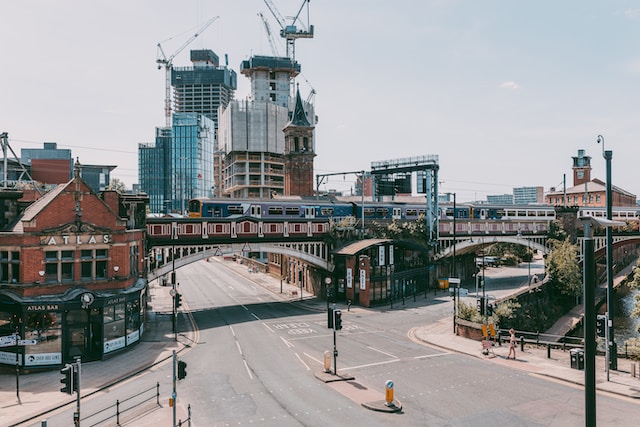Two of the biggest and most well-known cities in the United Kingdom, London and Manchester, are well-liked travel destinations for both tourists and locals due to their distinctive qualities, attractions, and cultures.
But it’s also important to consider some significant contrasts between these two cities. Therefore, we have compared the two cities based on their size, cost of living, weather, transportation, and job opportunities.
Contents
Size: Which City Is Bigger?
London is considerably bigger than Manchester in terms of both population and area.
With a population of more than 8 million as of 2021, London is the biggest metropolis in the United Kingdom and one of the biggest cities in the world.
In contrast, Manchester’s population in 2021 was a little over 553,230. This indicates that compared to Manchester, London has a population that is roughly 16 times larger.
London is also significantly bigger than Manchester in terms of size. Manchester is only about 116 square kilometers in size, compared to London’s approximate area of 1,580 square kilometers.
Thus, in terms of physical size, London is around 14 times bigger than Manchester.

London is also the capital city of England and the United Kingdom and is a global center for finance, culture, and tourism.
It is home to many famous landmarks such as Buckingham Palace, the Tower of London, and the London Eye.
Manchester, in comparison, is a major city in the northwest of England, known for its history of industry and innovation, as well as its cultural scene and sporting heritage.
It is home to landmarks such as Old Trafford, the Etihad Stadium, and the Museum of Science and Industry.
Cost Of Living: Which City Is More Affordable?
The cost of living can vary significantly between different cities in the UK.
When it comes to comparing the cost of living between London and Manchester, there are several factors to consider, including housing, transportation, food, and entertainment expenses.
- Housing:
For most people, housing is one of their largest outgoing costs, and in general, London is more expensive than Manchester.
According to Numbeo, a one-bedroom flat in the heart of London typically costs roughly £1,800 per month, compared to about £900 in Manchester.
In Manchester, a three-bedroom apartment rents for about £1,500 per month, compared to about £3,500 in London.
- Transportation:
Transportation costs can also differ between the two cities. In London, the cost of a monthly travel card for the public transportation system can range from £84 to £230, depending on the zones covered.
In Manchester, the cost of a monthly travel pass for the local transport system is around £60. Taxis and ride-sharing services are also generally more expensive in London than in Manchester.
- Food:
Where you shop and eat can affect how much food costs. However, on average, food costs more in London than in Manchester.

For instance, supper at a budget restaurant in London can cost roughly £15, while it costs about £12 in Manchester.
In Manchester, a pint of beer costs about £3.50, while a pint in London might cost approximately £5.
- Entertainment:
The cost of entertainment can also differ between the two cities. London is known for its West End shows and expensive tourist attractions, which can be pricey.
However, there are also many free or low-cost activities to enjoy, such as visiting museums and parks.
In Manchester, there are also plenty of things to do, including museums, galleries, and theaters, but generally, prices are lower than in London.
Weather: Which City Has A Better Climate?
Both London and Manchester have distinct climates, but which city has a better climate depends on what you’re looking for. Let’s take a closer look at each city’s climate:
- London:
Due to London’s temperate maritime climate, the city experiences mild winters and reasonably regular rainfall all year round.
London’s summers are normally not too hot, with average highs of about 22°C (71°F). The average low throughout the winter months is 8°C (46°F).
The wettest months in London are October and November, with an average annual rainfall of 23 inches.
- Manchester:
Although Manchester is a little wetter and cooler than London, it also enjoys a moderate maritime climate.
Manchester experiences pleasant to mild summers, with average highs of 18°C (64°F). Manchester’s winters are also chilly, with typical lows of 4°C (39°F).
It also experiences 34 inches of rain on average each year, with August and October being the wettest months.
What city has the best climate, then? Your particular tastes will determine this. London can be a better option if you want softer weather and less precipitation.
Manchester would be a better choice if you don’t mind little more rain and cooler temperatures.
Air quality is a further consideration. Some people, especially those who have respiratory problems, may be concerned about London’s high air pollution levels.
Manchester has also experienced air pollution issues in the past, but recent years have seen improvements in air quality.
Transportation: Which City Is More Accessible?
Manchester and London both have substantial transportation networks, including buses, trains, and underground/subway systems, making them well-connected cities in the United Kingdom.
London is unquestionably more accessible than Manchester, though, for a variety of reasons.
First off, compared to Manchester, London has a far bigger and more comprehensive transit infrastructure.
The London subterranean, often known as the Tube, is the world’s oldest system of subterranean railroads. It consists of 11 lines and more than 270 stations.
This makes it simple to move fast and effectively throughout the city, especially during rush hour.

With over 8,000 buses operating over 700 routes, London also has a vast bus network that makes it simple to get to even the most outlying parts of the city.
In contrast, Manchester has a smaller transportation system with only four subway lines and a smaller bus network.
While the Metrolink tram system has improved accessibility in recent years, it still does not offer the same level of coverage as the London Underground, and many parts of the city are not served by the tram.
London’s airports are another aspect that makes it more accessible. Heathrow, Gatwick, and Stansted are among the six international airports that serve London, making it simple to reach the city from practically anywhere in the world.
Manchester, in comparison, has just one smaller airport with fewer foreign flights.
Finally, London’s status as the capital city means that it receives more investment in its transportation infrastructure than Manchester.
For example, the ongoing Crossrail project, which will create a new high-speed rail link across London, is set to revolutionize travel in the city when it opens in 2022. Manchester has no equivalent project in the works.
Jobs: Which City Has Better Job Opportunities?
Major cities in the United Kingdom, London, and Manchester both provide a wide variety of employment options.
Manchester is the second-biggest city in England and has a booming economy, trailing only the capital and largest metropolis of the UK, London.
Some of the biggest banks, financial institutions, and legal firms in the world are based in London, a major global financial hub.
It offers a wide variety of businesses, including media, entertainment, and technology, all of which provide fantastic career prospects.
In addition, there are several universities, research institutes, and think tanks in London that provide prospects for academic and research roles.
The city’s size and diversity also make it a desirable location for foreign firms, which helps to broaden the job market.
Manchester, on the other hand, is a center for innovation and technology with a quickly expanding digital economy.
It is the location of MediaCityUK, a center for the digital and creative industries, and a number of significant IT firms have opened up shop there.
With a large number of shopping malls and entertainment venues, the city also boasts a booming retail and service sector.

Manchester, which serves as the hub of commerce for the North West region of England, is a desirable location for companies wishing to grow outside of London.
When comparing Manchester with London for employment prospects, London often has more openings and a wider range of sectors.
But as living expenses in London are also considerably higher than in Manchester, pay for jobs might need to reflect this. Manchester, on the other hand, can provide a higher standard of living at a lower cost of living.
In conclusion, both London and Manchester offer excellent job opportunities across various sectors.
London has a more extensive job market, but it also comes with a higher cost of living, while Manchester offers a lower cost of living and a more relaxed lifestyle.
Ultimately, the decision on which city has better job opportunities will depend on the individual’s preferences, career goals, and financial situation.

